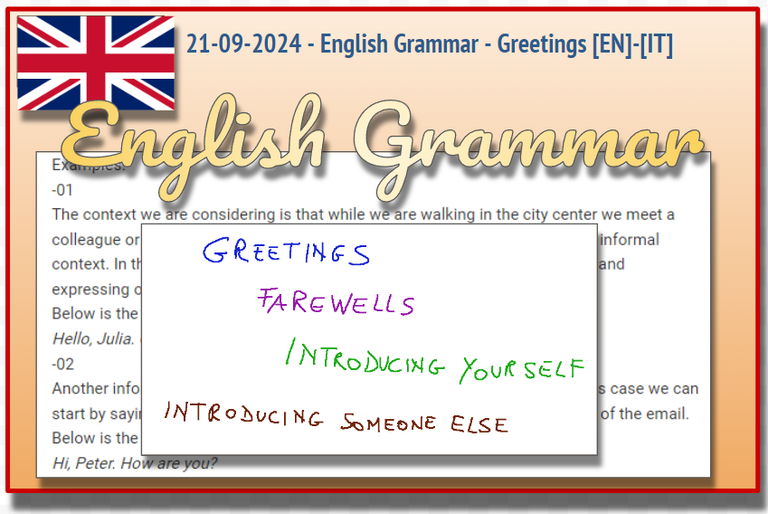
~~~ La versione in italiano inizia subito dopo la versione in inglese ~~~
ENGLISH
21-09-2024 - English Grammar - Greetings [EN]-[IT]
With this post I would like to give a brief instruction regarding the topic mentioned in the subject
(code notes: X86)
Greetings

As for greetings, in English, we must immediately take into account that they change depending on the context. There are greetings that are used if the context is formal and other types of greetings are used in an informal context.
Greetings can also change depending on the time of day.
Examples:
-01
The context we are considering is that while we are walking in the city center we meet a colleague or an old friend. We are therefore in a common situation, within an informal context. In this case we will greet the person we meet simply by saying hello and expressing our happiness at having seen them again.
Below is the sentence we can use:
Hello, Julia. Great to see you again.
-02
Another informal context is that of sending an email to a friend of ours. In this case we can start by saying hello and asking how they are and then continue with the rest of the email.
Below is the sentence with which we can greet and start our email.
Hi, Peter. How are you?
Goodbye

Goodbye greetings are usually always performed in the same way.
In English, you simply say the word goodbye, while, if it is the first time you meet the person, the goodbye is usually accompanied by a phrase of gratitude or esteem for this particular first meeting.
Introducing yourself

As for introductions, they can also be different depending on the context.
Here are some examples:
-01
If we meet someone during our trip we can introduce ourselves by letting the other person know where we come from.
Here is a typical sentence
I’m from Italy
If instead we are at a fair and we are having a sales meeting we can introduce ourselves by explaining to our interlocutor which company we work for. Here is an example.
I work for Ferrari
Introducing someone else

As for introductions, we have two types.
We can talk to someone by formally asking if we can introduce the person who is next to us. The typical sentence is the following:
Can I introduce you to Anna?
Another example is to introduce someone by asking the person we are talking to if they have ever met our friend before.
The typical sentence is the following:
Have you met Bob?
Conclusions
As for greetings, farewells, introductions, we know that in the English language they change depending on the context.
Question
Have you ever studied in depth the various nuances of how to introduce yourself and how to greet someone in English?

[ITALIAN]
21-09-2024 - Grammatica inglese - Greetings [EN]-[IT]
Con questo post vorrei dare una breve istruzione a riguardo dell’argomento citato in oggetto
(code notes: X86)
I saluti

Per quanto riguarda i saluti, in inglese, bisogna subito prendere in considerazione che cambiano a seconda del contesto. Ci sono dei saluti che si eseguono se il contesto è formale e altre tipologie di saluto invece vengono usate all'interno di un contesto informale.
I saluti possono anche cambiare anche a seconda del momento della giornata.
Esempi:
-01
Il contesto che consideriamo è che mentre stiamo passeggiando in centro città incontriamo una nostra collaboratrice di lavoro o vecchia amica. Siamo quindi in una situazione comune, dentro ad un contesto informale. In questo caso saluteremo la persona che incontriamo semplicemente salutandola e esprimendo la nostra contentezza di averla vista nuovamente.
Qui di seguito la frase che possiamo usare:
Hello, Julia. Great to see you again.
-02
Un altro contesto informale è quello dell'invio di una mail ad un nostro amico. In questo caso possiamo iniziare salutandolo e chiedendogli come sta per poi proseguire con il resto della mail.
Qui di seguito la frase con cui possiamo salutare ed iniziare la nostra mail.
Hi, Peter. How are you?
Addio

I saluti di addio solitamente vengono eseguiti sempre nella stessa maniera.
In inglese si dice semplicemente la parola addio, mentre, se è la prima volta che conosciamo la persona, solitamente l'addio viene accompagnato da una frase di riconoscenza di stima per questo particolare primo incontro.
Presentarsi

Per quanto riguarda le presentazioni, anche qui possono essere diverse a seconda dei contesti.
Qui di seguito alcuni esempi:
-01
Se incontriamo una persona durante un nostro viaggio possiamo introdurre noi stessi facendo sapere all'altra persona da dove veniamo.
Qui di seguito una frase tipo
I’m from Italy
Se invece siamo ad una fiera e stiamo facendo un incontro commerciale possiamo introdurre noi stessi spiegando al nostro interlocutore per quale azienda lavoriamo. Qui di seguito un esempio.
I work for Ferrari
Presentare qualcun altro

Per quanto riguarda le presentazioni abbiamo due tipologie.
Possiamo parlare con qualcuno chiedendogli formalmente se possiamo presentargli la persona che è vicino a noi. La frase tipo è la seguente:
Can I introduce you to Anna?
Un altro esempio è quello di presentare qualcuno chiedendo alla persona con cui stiamo parlando se ha mai incontrato il nostro amico prima d'ora.
La frase tipo è la seguente:
Have you met Bob?
Conclusioni
Per quanto riguarda i saluti, gli addii, le presentazioni, sappiamo che nella lingua inglese cambiano a seconda del contesto.
Domanda
Avete mai studiato a fondo le varie sfumature di come presentarsi e di come salutare qualcuno in lingua inglese?
THE END